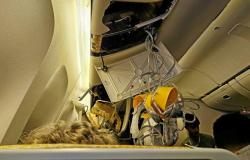- Author, Tyson Conteh & Tamasin Ford
- Role, BBC Africa Eye, Makeni & London
-
11 minutes ago
Sierra Leone’s President, Julius Maada Bio, took the bold step of declaring a national state of emergency over rape and sexual violence in 2019. Five years later, BBC Africa Eye looks at the issue of find out if survivors of assault are getting justice.
Warning : This article contains details that some readers may find upsetting.
In the town of Makeni, a three-hour drive east of Sierra Leone’s capital Freetown, a young mother sits outside her house with her three-year-old daughter.
Anita, not her real name, describes the day in June 2023 when she found her toddler with blood pouring from her diaper.
“I worked for this woman, and she gave me a commission this Saturday morning to go to the market,” she says, explaining that she then left her child with her employer and her 22-year-old son.
“He took my child,” he said, “to buy him candy and cookies. It was a lie.”
Some time later, when she found her daughter after searching for her, the 22-year-old mother saw that she was bleeding. She took her to the hospital and, after two sets of stitches, it was confirmed that she had been raped.
The nurses started examining the child and said, “Oh my God, what did this man do to this child? The doctor who was taking care of my child even cried.”
Anita went to the police, but the man fled and, a year later, the police were unable to find him.
“The president created a law so that anyone who rapes children will be arrested and sent to prison,” she says, furious that nothing seems to have been done.
She refers to a tougher law on sexual offenses, created five years ago after President Maada Bio declared a state of emergency over rape.
It follows protests organized in December 2018, during which hundreds of people wore white T-shirts bearing the inscription “Don’t touch our girls” marched in the capital, Freetown.
News of another child rape shocked the nation: a five-year-old girl was left paralyzed from the waist down. Journalists reported at the time that cases of sexual violence had almost doubled in the space of a year, with a third of them involving children. Sierra Leoneans had had enough.
The four-month state of emergency established in February 2019 allowed the president to devote state resources to combating sexual violence.
An updated sexual offenses law introduced tougher penalties for sexual assault.
Penalties for rape have been increased to a minimum of 15 years, or life imprisonment if it concerns a child. The following year, a model court for sexual offenses was established in Freetown to expedite justice.
Progress appears to have been made: reported cases of sexual and gender-based violence have fallen by almost 17%, from just over 12,000 in 2018 to just over 10,000 in 2023, according to police statistics .
Creating increased awareness and new structures is one thing, but ensuring that people, like Anita’s daughter, get justice is another.
The Rainbo Initiative is a national charity that works with victims of sexual violence. It says that in 2022, only 5% of the 2,705 cases it handled were taken to the High Court.
One of the problems is the resources available to those who are supposed to enforce the law.
At the Makeni police station where Anita reported her daughter’s rape, Deputy Commissioner Abu Bakarr Kanu, who heads the family support unit, says about four cases of child sexual assault are handled every week .
The main difficulty his team faces is the lack of means of transport to arrest the suspects.
He coordinates the seven police divisions in the region and, between them, they do not have a single vehicle.
“It happens that the suspect is available but, due to lack of vehicle, we cannot reach him to arrest him,” explains Mr. Kanu.
“Doing the right thing at the right time is a challenge.”
Like many people in Sierra Leone, he was impressed by the government’s action following the state of emergency.
“We have enough good laws and policies, but structure and staff prevent us from comprehensively addressing issues of sexual and gender-based violence in Sierra Leone.
Even if the alleged perpetrator is apprehended, it is even more difficult to bring him before a judge.
For a rape case to be heard, there is only one person in the country who can sign the documents: the attorney general. This measure was supposed to speed up the process and allow cases to go directly to court, but it created another bottleneck.
“Currently, it is not possible to have an indictment for sexual offenses signed by another judicial officer or counsel,” said State Counselor Joseph AK Sesay, a government-employed lawyer. .
“The 2019 amendment states that only the attorney general can sign an indictment. So this poses a problem when it comes to forwarding indictments to the courts.”
Information Minister Chernor Bah admits that this process is not perfect, but says it is “a process that we will continue to improve.”
Asked why many feel little has changed when it comes to seeking justice for rape victims, he acknowledged that “in some communities, that’s how people feel.”
But he rejected the idea that there has been no progress.
“I think the systemic reforms that we’ve put in place are there. The new laws are there. And those steps, I think, have led to a general sense that we’re not in the deep, dark days of 2019.”
For Anita, back in Makeni, almost a year has passed since the rape of her toddler.
Having received no new information from the police, they simply published the photo of the alleged suspect on Facebook.
“I want people to help me search for the boy. I’m tormented and I’m not happy. What happened to my child, I don’t want it to happen to any other child.”
You can watch the full BBC Africa Eye documentary Behind Closed Doors – Sierra Leone’s Gender Violence Epidemic on the BBC website. BBC Africa YouTube channel.






